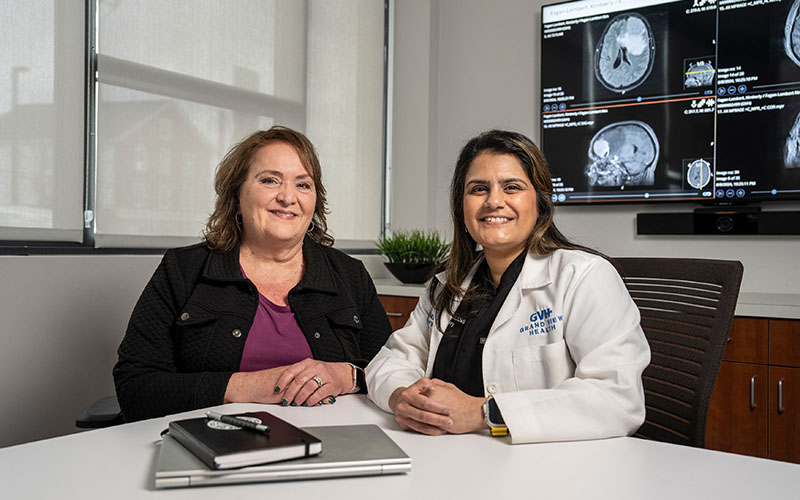Brain Tumor Patient’s Message: Don’t Ignore Your Symptoms
Many of us feel occasional neck or back pain from looking down at our mobile devices for too long. That’s why Kim Fagan-Lambert wasn’t concerned when she started feeling the same type of discomfort early last year.
“At work, we record and document everything in an electronic tablet,” says Kim, 62, a nurse with Grand View Home Care. “So, I brushed off my symptoms, thinking they were related to that.”
Kim’s discomfort eased – briefly – when her husband, Jim, bought her a stand for her tablet. But then came more concerning signs. “One side of my face would go numb, then the other side, and then it would go down my arm,” she says. “But it would go away as fast as it came.”
Fateful trip
While vacationing last summer, Kim’s symptoms became obvious to her family. “My sister saw that I was walking funny. I was laughing all the time and couldn’t have normal conversations,” remembers Kim.
When she returned to her Hilltown township home, her sister urged Kim to go to the Grand View Health Emergency Department. “I could not even remember my birthday,” Kim says.
Surprise finding
An MRI and CT scan revealed that Kim had a meningioma, a benign tumor about the size of a small lemon, that was pressing against the frontal lobe of her brain.
“Kim’s tumor was quite large and was surrounded by a lot of brain swelling,” says Ami Raval, MD, a neurosurgeon and brain tumor specialist with Grand View Health Neurosurgery. “Because the tumor was located in the left frontal part of her brain, it affected her speaking, and the swelling around her tumor also affected her behavior and even changed her personality.”
In the ER, Kim received IV steroids to reduce the swelling around her tumor. But she would still need surgery to remove the tumor, followed by radiation therapy to prevent it from returning.
Precise surgery
On Aug. 14, 2024, Dr. Raval performed Kim’s craniotomy using the Q Guidance System from Stryker. “The navigation system helped me map out the exact location of Kim’s tumor and pinpoint the margins so I could remove the entirety of the tumor,” Dr. Raval says. Grand View was the first hospital in Pennsylvania to use the Q Guidance System.
After the surgery, Kim completed radiation at Grand View and continued following up with Dr. Raval at her office in Colmar. “Dr. Raval was great, and every single person I met was excellent,” Kim says. “Grand View is a small community hospital with all the technology you can find at bigger hospitals.”
Kim went back to work in December and is back to gardening, cooking and spending time with her husband and three children. Her advice to others: “Don’t dismiss any little symptoms you might have, because they could be something serious.”
Local care for all brain tumors
At Grand View Health Neurosurgery, board certified, fellowship-trained neurosurgeons Ami Raval, MD, and Howard Eisenbrock, DO, provide personalized care for complex spine and brain conditions locally.
Dr. Raval specializes in malignant and benign tumors, including skull-based tumors and spinal metastases. She also performs cranial trauma surgeries.
Grand View Neurosurgery has offices in Colmar and Doylestown.
Call 215-257-3700 or visit GVH.org/Neurosurgery to make an appointment.

